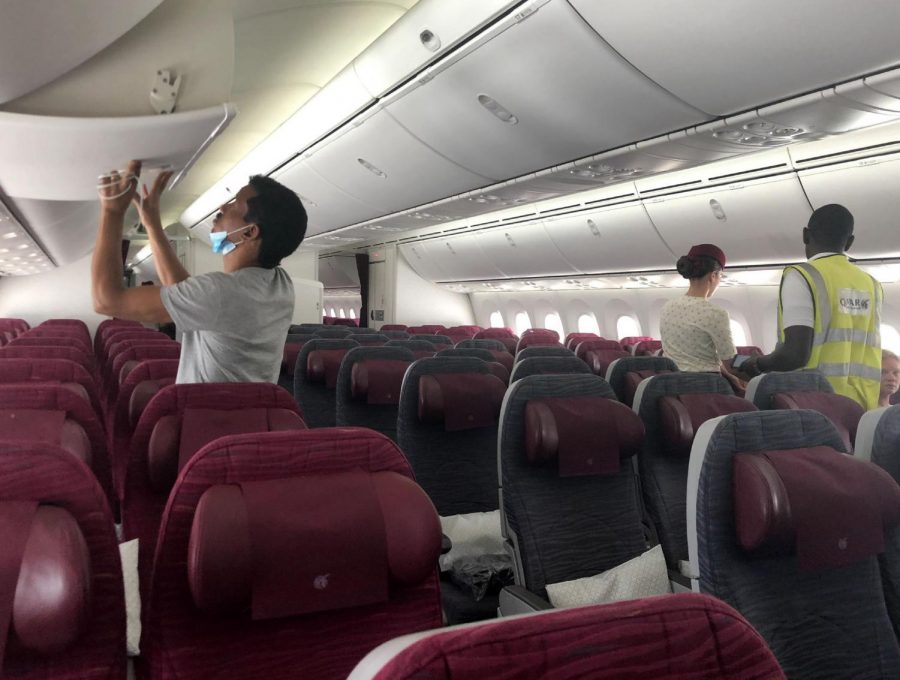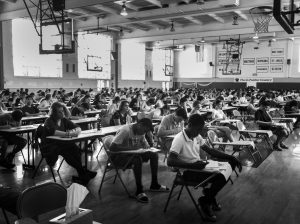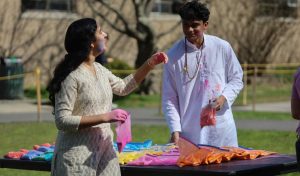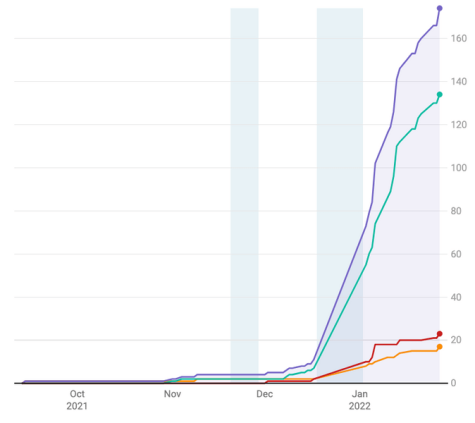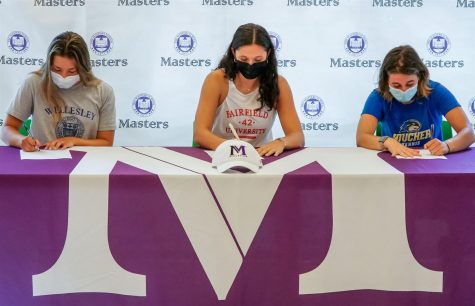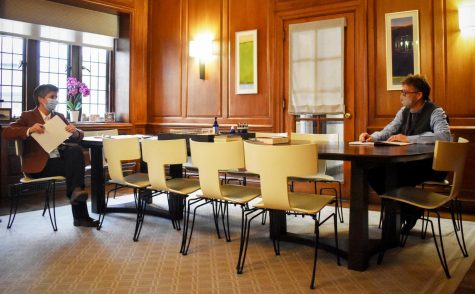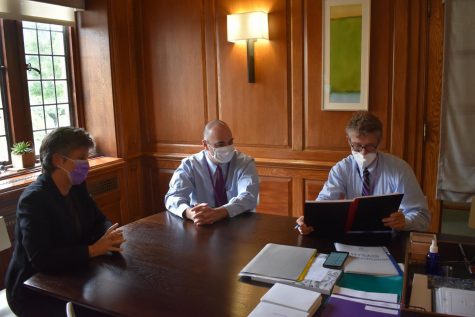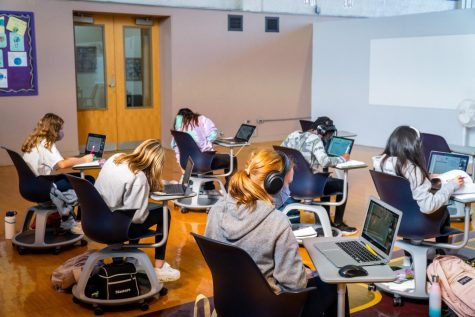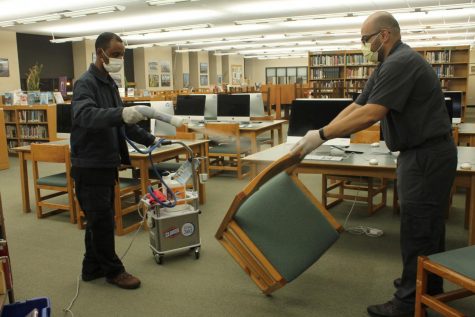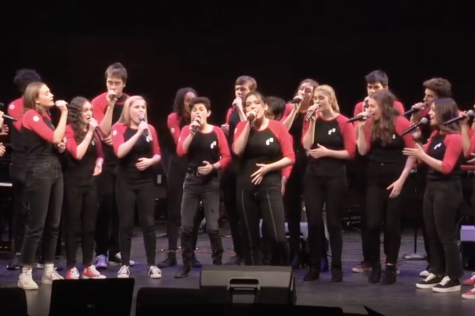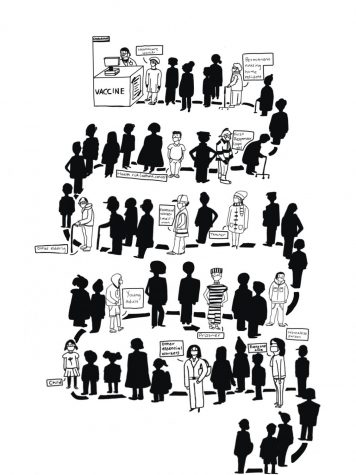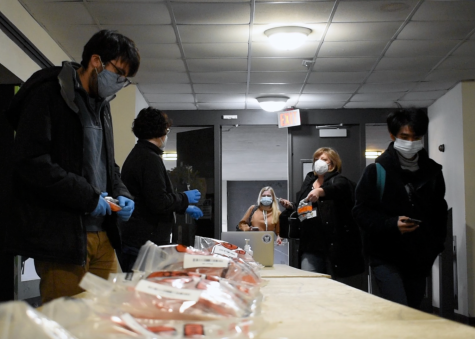Flying 7,000 miles home to Uganda and some lessons learned from Ebola
March 26, 2020
Junior Mattilyn Stone has recently returned to Kampala, Uganda where she lives with her two-year-old sister, seven-year-old brother, mom and stepdad. Below, she details her journey back home, her quarantine, how the Ebola outbreak has affected the Ugandan response to coronavirus and the possibility of being evacuated out of the country.
Q: How long have you been back in Uganda?
A: My mom and I were in Kenya. We just got back to Uganda in the nick of time actually. There were rumors that Museveni, as president, was planning on shutting down the only airport in Uganda and the borders, which meant we would be separated from everyone, so we got on a plane that day to fly back.
Q: You mentioned that you were stranded in Kenya, do you want to elaborate on what restrictions you were under and why you were there instead of just going back?
A: When I was flying it was basically that I didn’t know. I thought I was going straight to Uganda. As soon as I got off the plane, at a stopover in Kenya [Jomo Kenyatta International Airport], my mom called me and she told me not to get on my flight to Uganda. She said, “If you come here, you’re going to be completely isolated from the entire family for 14 days,” like no contact whatsoever. But Kenya hadn’t implemented the protocols that Uganda has put in place so the embassy just recommended that my mom meet me in Kenya, and we just started our family vacation a week earlier, which we planned to do. We went early thinking we could meet our whole family in Kenya. However, things have rapidly changed since then because Kenya has gotten some cases. Now we [from Uganda] can’t go to Kenya at all. My whole family is in quarantine right now. Things have rapidly changed in Uganda. It’s the epicenter of the World Health Organization for Africa because of the Ebola stuff. They don’t have the infrastructure to handle corona if it came here, which is why they’re shutting everything down. Almost the entire country is kind of on a quarantine right now, even though there have been 0 cases here.* Museveni gave a speech, and he said that we can’t stop foreigners from leaving but if you leave, you won’t be able to come back in the 32-day period in which they’re kind of shutting everything down. If you come home, you will be put in quarantine, in a hotel they have for quarantining. And so they quarantined a whole entire flight, just after we got in. They almost didn’t let me into the country yesterday.
*NOTE: Since this interview, Uganda has had cases of coronavirus. As of upload time at 6:00 p.m. on March 26, there are 14 positive cases in Uganda.
Q: Why didn’t they let you in?
A: They were taking temperatures and stuff, and if you have zero symptoms, they’ll let you in for quarantine. The airports have no air conditioning and I was wearing a sweatshirt because the airplane was cold. We were standing in the sun when we got off the plane, and so my body temperature was high. When they took my temperature, it was at like 38 degrees. (The normal human body temperature is 37 degrees Celsius). And so they were like, “We can’t let you in.” My mom said, “Let us sit down in the shade for 30 minutes,” and my body temperature, of course, went down and was around 36.6 degrees. And so then they were like, “Okay, you can go in.”
Q: What have you been doing in quarantine?
A: When I was in Kenya, my mom and I just went to the vacation spot earlier. It’s kind of a beach spot, and we just hung out there. Since we’ve been here, I’ve pretty much just slept. There’s not much to do in the house. With everything on lockdown, there could be food shortages and stuff here. And with the airport possibly being shut down completely, there’s a possibility that the embassy community will be evacuated. There’s that. Otherwise, I’ve been napping and I’m watching a movie with my family. A lot of just being in my house.
Q: Does the embassy community include you?
A: So the embassy community is all U.S. diplomats that are in-country, which includes me and my entire family because my stepdad’s a diplomat and everyone in my family is a dependent of him.
Q: Where do you see coronavirus going, a month from now, in Uganda? What are you seeing that’ll happen in the future if you see anything happening?
A: Currently, for the entire country as a whole, for the next 32 days, all bars, concerts, churches, and schools have been shut down. Marriages will be postponed…culturally you have big groups of people, funerals have been postponed, if they think of anyone who has died of coronavirus, the government will bury the person themselves so the family won’t be able to bury their own family members. And that’s just because they’re taking preventative measures when they had to deal with Ebola, because that was a huge crisis here too, and just in Eastern/Western Africa. There’s kind of a cultural custom to wash the bodies after they die, and that’s been proven to spread Ebola. No political meetings, the country is basically shut down. I don’t think they’re exporting goods here. Hopefully, it only lasts 32 days. And hopefully, you know, coronavirus in the rest of the world will calm down. But, I think if you look at a lot of the predictions, they are estimating June, July, August, which means most likely, things will just continue [here] too. The 32-day mark will most likely be extended. And we don’t know how long that could last, and I think it’s an important measure that Uganda has taken for the safety of their country because they really don’t have the infrastructure to handle an outbreak here, cause they don’t have medical facilities and such. I think it’s really smart on [the part of] the government.
Q: Are you planning on staying in Uganda for the rest of the school year? What concerns do you have? If you’re not staying in Uganda, where are you staying?
A: We’re staying in Uganda until May 5th just to do online schooling, unless we’re evacuated. My one problem with that though is the school is saying that you have to be on time for classes, and that means my classes will go late into the evening here, which is kind of a problem because I’m generally a person who goes to bed early. The school hasn’t really acknowledged the international community in that sense for students, for people who aren’t in the U.S. or in the same time zone.** And I know for Outspoken, they’ll still be meeting, and that meeting will be happening at 1 a.m. in the morning for me. And that’s kind of a problem. I still really want to participate, however, sleep and such. That’s more of an issue that has come up with online learning. If we go back early, we’ll most likely be going back to Vermont.
And my stepdad has been deemed high-risk if he gets it because his lungs collapsed a couple of years ago, so that is an issue if he were to get it. However, if school hopefully starts again, in person, I’ll most likely be living with my aunt [who lives in Dobbs] just so that I’m closer to school and be able to go.
**NOTE: Since this interview, Director of Global Studies and Civic Engagement Robert Fish has announced in an email that students who are at home in a different time zone will not be required to “be in class” if the class meets past midnight in the student’s time zone.
Q: Can you explain why U.S. diplomats might be evacuated?
A: If it does come to airports being shut down and borders being closed, the imports of foods [slow] and people start panic-buying–kind of like in the U.S.–that becomes a problem here because food could run out. There could be food shortages, especially since we’re living in bigger cities and not around people who are growing their own food. Local markets possibly being shut down because those are crowds of too many people. Food shortages cause problems and airports shutting down creates panic about not knowing what to do and being stuck, which is a problem for the United States government. They want to make sure they have the option to get their own people out. At that point, they’ll most likely have a plane and put all the U.S. embassy people on the plane and fly them back to the U.S. They don’t want to be responsible for people going hungry or whatever issues could arise, like the lockdown and such. It is a police state here and it’s kind of unknown what some of the causes and effects and consequences of the lockdown here are.
Q: Is there anything you want to add?
A: Relatively, I’m incredibly lucky that I’m with my family during all of this. And I think that was always my mom’s main thing. She was like, “I want my entire family together.” Even with the risk of being quarantined and possibly not being let back into Uganda–that whole situation which was scary for my mom. So if we’re all evacuated, we’re all evacuated together. If we’re in quarantine, we’re all in quarantine together. That is one thing that I am incredibly thankful for. With all the anxiety and unknown happening, I get to share that with my family which I know that a lot of people don’t, and my sympathy and empathy goes to them.
NOTE: Mattilyn Stone serves as the Photography & Illustration Editor on the Tower staff.





